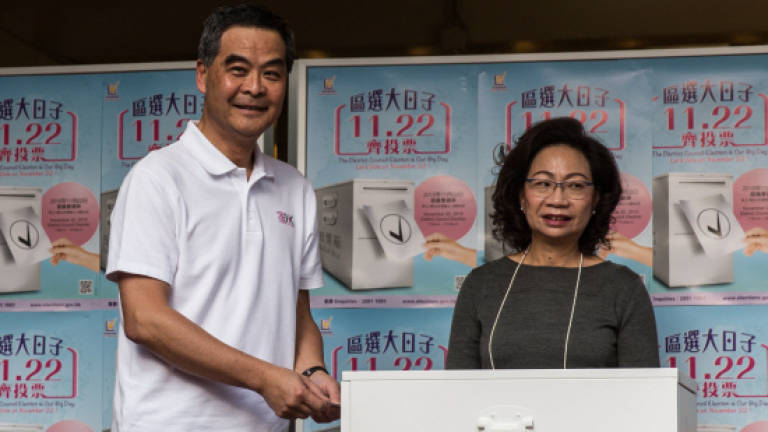Hong Kong goes to polls in first vote since democracy protests

HONG KONG: Hong Kong went to the polls Sunday for the first time since huge pro-democracy protests gripped the city, in a key test of public sentiment.
The spotlight is on the district elections to gauge whether support for the democracy movement can translate into votes and bring change to the political landscape.
Hong Kong is semi-autonomous after being handed back by Britain to China in 1997, but there are fears that Beijing's influence is growing.
Tens of thousands of protesters took to the streets for more than two months at the end of last year demanding fully free elections for the city's next leader, in what became known as the "Umbrella Movement".
The rallies were sparked after Beijing insisted candidates for the first public vote for Hong Kong's leader in 2017 would first have to be vetted by a loyalist committee.
Some voters said Sunday the democracy movement had motivated them to cast their ballot.
"It's the little power we have," said 28-year-old administrator Kris Fong, voting in the northern district of Yuen Long.
Fong said she had chosen a pro-democracy candidate because she felt the city was being "manipulated" by Beijing. She had missed previous elections but said voting this year was more important.
"After last year's umbrella revolution I feel that, however insignificant our vote might be, it's our only legitimate way to tell the people ... up north what we are thinking," said Fong, referring to powers in Beijing.
Student leader Joshua Wong, 19, the teenage face of the democracy movement, was eligible to vote for the first time.
"I finally cast the first vote of my life," he said in a Tweet.
"Feeling exhilarated."
'Umbrella Soldiers'
Despite galvanising widespread support at the beginning of the mass street protests, democracy activists were unable to win concessions on political reform from the authorities in China or Hong Kong.
The movement has since splintered, as young campaigners have become frustrated.
This year's district vote sees the new generation of democrats stand against the old guard in some seats, giving pro-government candidates a chance to capitalise on a split vote.
The younger candidates, many of whom cut their teeth during last year's mass rallies, have been dubbed "Umbrella Soldiers" by local media.
The umbrella became symbol of the movement as protesters used them to shield against the elements, and to protect against pepper spray and tear gas fired by police.
Voters will choose 431 representatives for the 18 district councils – currently pro-establishment parties hold a majority in every council.
Pro-government candidates are casting themselves as a force for stability, in contrast with democracy campaigners who they blame for disrupting life in the former colony.
Meanwhile, democrats are trying to overcome a sense of hopelessness that has descended since the failure of the movement to force reform.
Although pro-democracy lawmakers succeeded in voting down the Beijing-backed bill that sparked last year's protests, some supporters now question whether meaningful change can ever be brought to a political system so closely tied to Beijing.
Analysts say it is unlikely the democrats will significantly increase their seats Sunday, outgunned by the well-funded and better organised pro-government camp.
But young activists say making a stand is an important first step for the next generation of antagonists, even if they lose.
For some voters, however, local daily-life issues outweigh politics.
"We just want someone who is actually doing their work (at district level)," said one 68-year-old voter who gave his name as Lau.
"Politics should be dealt with by the government." — AFP